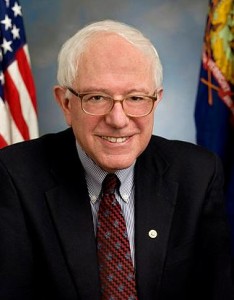Bernard Sanders (b. 1941) was born in Brooklyn. He studied political science at the University of Chicago in the 1960s, and was a leader of the Civil Rights Movement on campus, for which he was once arrested. After graduating, he spent some time in a kibbutz in Israel. In 1971, Sanders joined the socialist, anti-war Liberty Union Party. He ran for governor and senator many times, but never won. In 1981, he was elected mayor of Burlington, the largest city in Vermont. Sanders brought Burlington back to life, balancing the city’s budget, rebuilding its downtown area, and making Burlington the first city in US history to finance community housing. Sanders was an extremely popular mayor, and was re-elected for four terms. He then briefly taught political science at Harvard before finally winning a Congressional seat in 1990. This made him the first independent to be elected to the House of Representatives in 40 years. He served as a Representative until 2007, and as a Senator since then. That makes him the longest-serving independent Congressman in American history, as well as the only Congressman to openly identify as a socialist. Sanders opposed both wars in Iraq, the bailout of banks in 2008, the NSA, and the unpopular Patriot Act, along with many other bills aimed at expanding government powers. As a member of the Senate Budget Committee, he has focused on “rebuilding the middle class” and is working towards raising minimum wages and social security. He has also been voted the top senator with regards to environmental action, and won an award for his support of war veterans. Not surprisingly, Sanders has won essentially all of his elections by huge landslides, and holds a very high approval rating, making him among the most popular senators in the US. In 2010, following his incredible 8.5 hour speech to Congress that focused on helping the disadvantaged, many began urging Sanders to run for president. On April 30, 2015, he finally announced his candidacy. True to his beliefs, he rejected large “Super PAC” donations, and said he will finance his campaign through small individual contributions. Within 24 hours of this announcement, he raised $1.5 million through small donations averaging $43. By July 2nd, his campaign already raised $15 million through 400,000 donors (nearly triple the number that Obama had, and in less time). The day before, his speech in Wisconsin was attended by over 10,000 people, making it the largest turnout thus far for any presidential candidate. Among other issues, Sanders’ platform is focused on wealth inequality, “getting big money out of politics”, free university education, Wall Street reform, media reform, and investing in more renewable energy sources. He is now considered a top candidate for winning the presidency, which would make him the first Jewish president in American history.
Words of the Week
A guy named Adolf Hitler won an election in 1932. He won an election, and 50 million people died as a result of that election in World War II, including 6 million Jews. So what I learned as a little kid is that politics is, in fact, very important.
– Bernie Sanders

